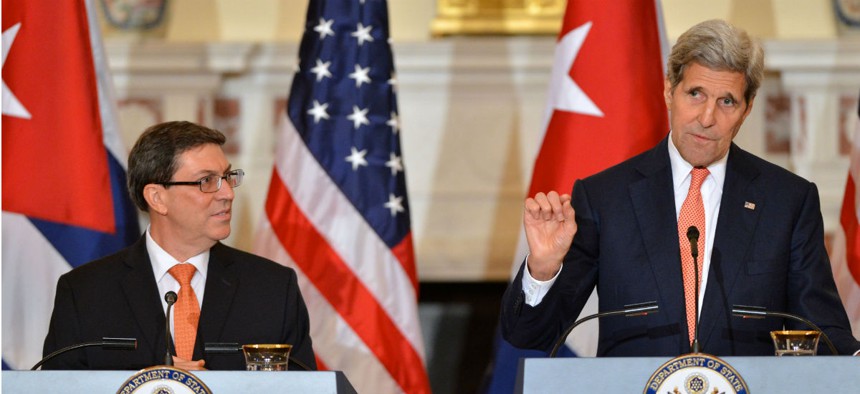
Secretary of State John Kerry holds a joint press conference with Cuban Foreign Minister Bruno Rodríguez (left) on Monday. State Department
John Kerry on Restoring Relations With Cuba: 'Nothing is More Futile Than Trying to Live in the Past'
After more than a half century, the U.S. and Cuba took a major symbolic step toward re-establishing diplomatic relations.
The U.S. and Cuba reopened their embassies in Havana and Washington on Monday, marking a new chapter in diplomatic relations.
Secretary of State John Kerry called it a "historic day" during a joint news conference with Cuban Foreign Minister Bruno Rodriguez in Washington. It is the first visit of a Cuban foreign minister to the State Department since 1958, Kerry said.
"This milestone does not signify an end to differences," Kerry said. "We have begun a process of full normalization that is sure to take time but will also benefit the people in both Cuba and the United States."
The U.S. and Cuba severed diplomatic ties in 1961. Since the 1970s, each was represented by limited-service interests sections at their capitals. That changed on Monday.
Rodriguez attended the flag-raising ceremony at the Cuban embassy on 16th Street NW. The U.S embassy in Havana also opened, but with no ceremony. Kerry is expected to travel to Havana on Aug. 14 to unfurl the American flag at the embassy.
On August 14, it will be my honor to raise the American flag at our Embassy in Havana, #Cuba for 1st time in 56 years. #USCuba
— John Kerry (@JohnKerry) July 20, 2015In a statement Monday, the White House said the openings "are the result of respectful dialogue" between the two countries since the December announcement that relations would begin to thaw.
"Beginning today, our diplomats in Havana will have the ability to engage more broadly across the island of Cuba, with the Cuban government, civil society, and ordinary Cubans," said White House press secretary Josh Earnest in the statement. "We look forward to collaborating with the Cuban government on issues of common interest, including counterterrorism and disaster response."
At the State Department, the Cuban flag was added to the flags of other countries that have diplomatic relations with the U.S. But the work to normalize relations is hardly over.
"It may be long and complex," Kerry said of the process. "Along the way, we are sure to encounter a bump here and there, and moments even of frustration. Patience will be required."
Rodriguez reiterated the length of the process as well as other points of concerns, including the lifting of the trade embargo, return of Guantanamo, and respect of Cuban sovereignty.
"I can say that the fact that diplomatic relations are reestablished and opening both embassies is a show of the mutual willingness to move on for the implementation of bilateral relations," he later added, speaking in Spanish.
President Obama announced earlier this summer that the embassies would reopen. The president noted then that while there have been "very real, profound" differences between the two countries, diplomatic isolation "doesn't work."
Cuba has also been taken off the list of state sponsors of terrorism, which paved the way for some barriers against the country to be lifted, though only Congress can end the trade embargo.
The White House still faces an uphill battle with lawmakers to normalize ties with Cuba. "There exists bipartisan support for advancing the policy that the president announced to normalize our relations with Cuba, but there have been some entrenched partisan interests that have tried to block this in Congress so far," Earnest said Friday.
A CBS News poll, however, shows that 58 percent of Americans favor restoring relations.







